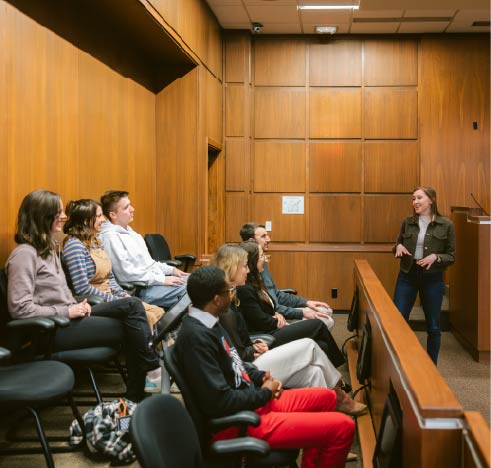Curriculum
Coursework integrates applied perspectives, empowering students to address real-world legal challenges.
This undergraduate minor requires completion of a minimum of 15 credit hours. Students are required to take four classes (12 credit hours) in foundational courses and one additional course (3 credit hours) from the special topics listed below.
Take all of these courses
- PUBAFRS 2110 - Introduction to Public Affairs (3)
- PUBAFRS 4510 - Law and Public Affairs (3)
- LAW 4030- Introduction to the American Legal System (3) *
- LAW 4035 – Understanding Jurisprudence: An Introduction to Legal Theory (3)
*Students may substitute LAW 4796: Anglo-American Legal System (Ohio State/Oxford Pre-Law Program 6 credits) for this course. If a student takes LAW 4796, the student does not need to take a course from the elective list, below.
Public Institutions, Administration, and the Law
- PUBAFS 3210 - Civics, the Making of Law, and the Development & Implementation of Public Policy (4)
- PUBAFS 3220 - Citizenship in the Age of AI: Law, Technology, and Social Justice (3)
- PUBAFS 5506 - Administration of Criminal Justice Policy (3)
- PUBAFS 5510 - Cybersecurity Law, Management, and Policy (3) **
** This course requires prior cybersecurity knowledge. Students are expected to have taken ECE 5561: Introduction to Cybersecurity or PUBAFRS 5570 Data Governance in the public sector. Students can obtain a waiver through permission from the course instructor by having taken an equivalent course or by having prior experience.
Law and other Special Topics:
- LAW 4015 Difficult Conversations in Polarized Times (1)
- LAW 4020 Engaging with Polarized Groups (1)
- LAW 4025 Facilitating Potentially Contentious Meetings (1)
- AEDECON 3170 - Agribusiness Law (3)
- AFAMAST 4610 - African Americans and the Law (3)
- BUSMHR 4244 – Negotiations (3)
- COMM 3404 - Media Law and Ethics (3)
- ENR 4648 - Environment and Natural Resources Law Enforcement (3)
- ENR 5642 - Environment and Natural Resources Administration (3)
- INTSTDS 4242 - Incomplete Democracies: the (Un)Rule of Law in Latin America (3)
- INTSTDS 5800 - International Law (3)
- POLITSC 4130 - Law and Politics (3)
- POLITSC 4135 - American Constitutional Law (3)
- POLITSC 4138 - Women and the Law (3)
- PSYCH 4485 - Psychology and the Law (3)
- SOCIOL 4509 - Sociology of Law (3)
- SOCWORK 5015 - Social Work and the Law (3)
- WGSST 3200 - Breaking the Law: An Introduction to Gender Justice (3)
Students may petition to use courses that are relevant. They should check with Glenn College advising as to the appropriateness of the courses.
Students may also count internship credit from any department (e.g. PUBAFRS 4191.01), provided the student completes an internship related to law and public affairs.

